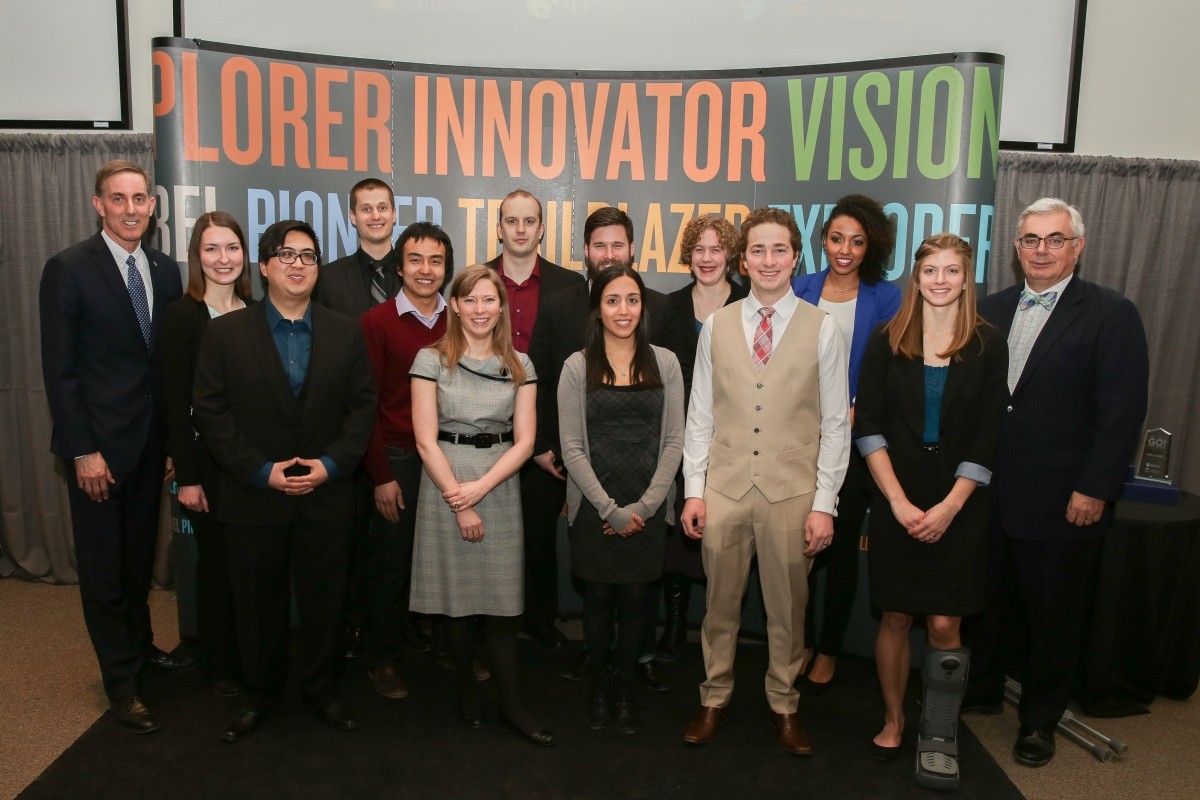
Jay Doering, vice-provost (graduate education) and dean of graduate studies and president and vice-chancellor David Barnard with the finalists from the 2015 3MT competition
Grad Students: Get Ready for 3MT
Applications for the Three Minute Thesis open Dec. 9
They may not realize it, but University of Manitoba graduate students will likely get a taste of the Three Minute Thesis (3MT) competition over the holiday break. As they get together with family and friends, they may have to explain their research to those who don’t know anything about it.
When broken down, this is exactly what 3MT is all about. The ability to communicate complex ideas, without getting buried in the details is a skill that can be refined, says Jay Doering, vice-provost (graduate education) and dean of graduate studies.
“3MT is like an elevator pitch,” says Doering. “Except it’s a longer elevator ride. Students are faced with the challenge of distilling the essence of their thesis into a clip less than three minutes.”
It can take years for a graduate student’s thesis to be thought through and executed. Condensing all of that information into only three minutes, and still being able to get the message across to a non-specialist audience is challenging but also rewarding.
“This is not an easy task,” adds Doering. “A student has to outline the topic or issue, underscore the relevance and then outline his or her contribution. Drawing attention to their research helps to promote their work and build confidence.”
In 2013, Leah Guenther won the first 3MT competition at the U of M. After graduating with a master of science, she is now a biomedical engineer with the Orthopaedic Innovation Centre. She considers the competition a valuable experience.
“3MT challenged me to make my research interesting, relevant, and memorable,” says Guenther. “It forced me to step out of my comfort zone, and to look at the big picture, to think outside the box, and then to put the big picture inside the box. I learned that it wasn’t about how much I could say in three minutes, but how much I didn’t have to say in three minutes, and there was a lot.”
The U of M includes 3MT as part of an overall strategy to provide career building opportunities for graduate students, promote research at the university and also connect with the broader university and surrounding community.
Plus, the experience looks great on a resume.
“3MT is about being cohesive, concise, and compelling – in three minutes,” says Guenther, who notes that the skills she learned in 3MT led to success when presenting at academic conferences and in her career. “3MT made me a better communicator by changing the way I approach any kind of presentation: making knowledge accessible, while still being informative, relevant, and interesting.”
This is the fourth year the U of M is holding 3MT. Last year’s winner at the U of M, Rebecca Dielschneider, came in second place in the national competition.
Applications for the 2016 competition open Dec. 9 and close Jan. 12. This year students have to submit a 30 second video to apply. There is no written application. If students don’t have access to a recording device they can borrow an iPad from the Faculty of Graduate Studies.
Once the challengers are selected, they will compete in a round of heats. The top three winners from each heat will receive an iPad mini, while the prizes for the final competition are: $5,000 for First Place, $2,000 for Second Place and $1,000 for People’s Choice.
The final competition will be held on February 25, 2016, at the Robert B. Schultz Lecture Theatre at St. John’s College. The public is invited to cheer on the challengers as they compete in the finals.
More information on the rules and eligibility can be found on the 3MT website.
Research at the University of Manitoba is partially supported by funding from the Government of Canada Research Support Fund.






